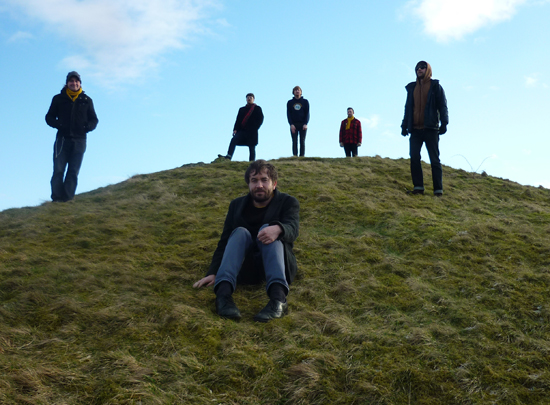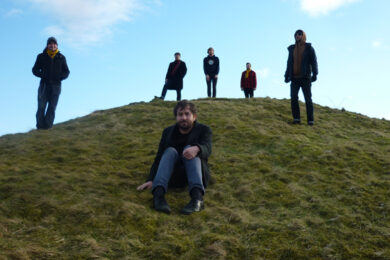"I think I’d like to do stand up, I suppose," Russell Walker of The Pheromoans says offhandedly when conversation turns to controversial comedians in a non-descript pub in King’s Cross. Walker and his motley band of misfits aren’t much for following the status quo. Probably better-loved in the US than South England where they’re based, The Pheromoans’ awkward anti-aesthetic of clumsy rhythms and poorly played instruments has had them compared with the Swell Maps and The Raincoats of the UK’s post-punk past. And although it’s easy to see how, they’re more than an outdated effigy to a movement passed – there’s much to be said for Walker’s bitterly funny social critique.
For this year’s LP Does This Guy Stack Up? it’s as if The Pheromoans group persona is immune to joy. Much like their first, this second album is laced with merciless observations on the injustice and absurdity of modern English life. The whirling outsider anthem of ‘A Freak’s Xmas’ moans about the awkward breakfasts, alcohol cravings and mindless shopping that come with the holiday. A lumbering commentary on ‘Don’t Mention It’ takes aim at the snobbery and sleaze of today’s Royal Ascot Festival ("pink Champagne and the puppetry of the penis / I feel no pain").
To look at the misanthropic librarian, husband and father, you wouldn’t think he was in a band. In a gingham shirt, with a slouch and hidden in the corner, it’s as if he’d rather avoid than engage a crowd. But live, he is bizarrely magnetic. Draped over his mic stand, eyes mostly closed and half speaking, half groaning to the jolting racket of his five fellow bandmembers – Dan Bolger (keyboard/violin), The Octogram (bass), James Hines (drums), James Tranmer and Alex Garran (both guitar) – Walker’s like an unaffected, slightly awkward, Jim Morrison. It feels only natural that the songs, recorded in a matter of hours, should come together live in this uniquely cadenced and wobbly way. In conversation with Walker it becomes clear that his is a hopelessly idealistic attitude, as he talks about implied racism, class war and what it’s like to be the part of the collateral of a failed ‘Cool Britannia’.
With the title Does This Guy Stack Up? are you referring to yourself as a new dad?
Russell Walker: [Laughs] I guess it just means… the very idea that you could say that about someone just amused me. I don’t know where I heard it, on TV or something. Maybe it was the radio, talking about a business deal: ‘you have to ask yourself, does this guy stack up?’ [laughs]. Well, you do, I guess. But it has a double meaning. I think my songs were more outwardly hostile on the last album and these are more doubtful about myself. That’s a terrible answer. I could have rehearsed that.
But you didn’t, so it’s all right.
RW: Oh yeah. Having a child, or whatever, there are sort of doubts. If you go through life thinking you’re right and everyone else is wrong, which I do, it’s quite stressful. But if something happens, a life-changing thing, it’s a probably slightly more stressful than it would have been otherwise [laughs].
Were you anti-children before or something?
RW: No, no, no [laughs]. I came up with that title before I found out. That would be awful if I chose that as a title after. Then it would be a sort of Coldplay title.
In ‘I’m A You Know What’ you talk about the adult as "the promiser" and the child as "the enforcer" – where did that come from?
RW: That’s when Hannah, my wife, was pregnant. It’s from the Robert Walser book called The Tanners. I read that and I thought it was a great line talking about the failings of adults from the perspective of the child; "the child is the enforcer". I started telling Hannah my wife that I wanted Rohan, my son, to be a revolutionary and stuff. She got quite upset and she was like, ‘no, I just want him to be normal’.
I think, if you have trauma or something, you carry the trauma around with you in a way and it’s kind of about admitting whatever it is you have to admit. It’s liberating when you hear people admit to their failings.
What do you do for work?
RW: I just work in a library. I don’t have any qualifications in it, really. I used to work in a public library but it has basically been dismantled. Now I work in a law library. It’s pretty good, I guess. I think a lot of people my age sort of missed the boat with careers and stuff because we were just finishing school when the ‘Cool Britannia’ thing was happening. You were convinced that life was going to be this magical roller coaster with Tony Blair. It wasn’t just because of him but also ‘youthful optimism’. But now I’m married and I’m trying to make a go of it. Not having a job is so stressful, having been in that boat as well, you’re just grateful for anything, really.
It comes back to the Brighton thing. There were no jobs really available but then it was sort of seen as… I always tried to get a job somewhere, call centres or something, but you come up against some strange idealism; that you can somehow bypass that while still living in Brighton, which has the highest rent in Britain [laughs].
Like San Francisco. Bay Area punks.
RW: Yeah, well. We get asked to play gigs [in Brighton] and I always refuse because the bands that play there are just awful. Grunge revivalists.
I could probably name a couple of the bands you’re talking about.
RW: Maybe three or four years ago, when these sort of grunge bands started springing up, I think it was quite good for us because it gave us something to rail against. You know, all these bands that go skateboarding and stuff. I find it so strange, the effect that… I guess, the criticism of a lot of punk bands like The Clash and stuff were that they were middle-class, pretending to be working class. But then these guys are pretending to be middle-class Americans, which is quite odd [laughs].
Do you move around in punk circles?
RW: I listened to a lot of punk music but I guess, when we started in Brighton, the dominant bands were sort of ultra-punk and into politics. I suppose it was more noise, the style of music, but they had Mohicans and they’d always look down on us, for whatever reason. They’d feel sorry for us because we couldn’t pull it off. It wasn’t punk and it didn’t sound good either; it didn’t succeed on any level. We couldn’t even fall back on having an image, so I started to resent it.
It’s weird, it’s like post-punk never happened for them.
RW: It’s funny because they were talking about Pussy Riot just now on the news and they said the band were influenced by punk bands, like Cockney Rejects and the Angelic Upstarts; they listed all these bands that formed in 1978. [laughs]
It’s hilarious. If I was around in 1978 – I’m sure they weren’t either – but you wouldn’t be listening to these second-wave Oi! bands. It’s funny people’s idea of punk. It’s all like right-wing Sun journalists being the Oi! torch bearers.
Also, I can’t stand it when Americans go on about how they like skinhead punk bands from England. Because we just think they’re a joke. They’re implying they like the politics and the danger of it. But when you meet those people on the street, they’d be pretty horrible, I’d imagine.
The Pheromoans don’t appear to have much of a style.
RW: When I go to gigs, you’ve kind of got this veneer of people just fitting in. It’s like they’ve all been to a meeting and they’ve decided what they’re going to be like and wear and stuff. We feel kind of out of the loop.
Doesn’t everyone feel like that?
RW: Well, they say that.
Maybe that’s a writer’s sensibility. to feel on the outside looking in.
RW: Yeah, I don’t know. I guess with the lyrics, I try and put a lot of about how bad life is in but without trying to be sentimental and looking for sympathy. I feel like, going to work on the train, just feeling depressed beyond belief. It’s trying to convey that.
That’s what I was thinking on the way. You complain about… it’s just you complaining, essentially, about your job or whatever. You can see life for the bullshit it is but then you still choose to live it.
RW: [Laughs] I suppose if you’re romantic, or whatever, you just want every moment to be… Well, romance and cynicism are just the same kind of thing. You want things to be in a certain way and if they’re not you get upset. But that’s just the way I am. It’s nobody’s fault. It’s my fault. But it’s still a valid thing to put in a song.




